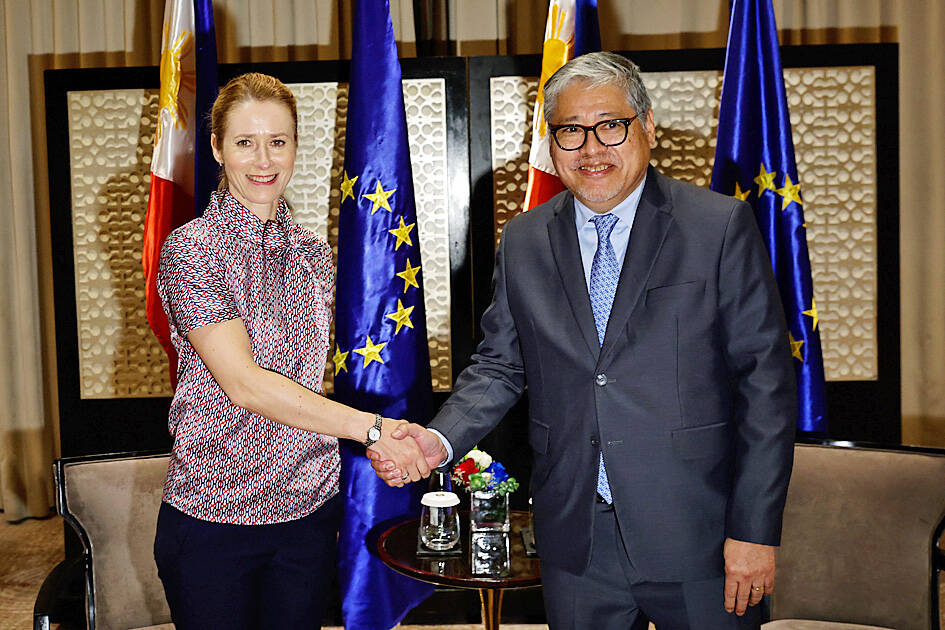Defense officials from Europe and Southeast Asia called for stronger collaboration to protect the global network of subsea cables as concerns grow over threats to this vital infrastructure.
Countries such as Singapore and Malaysia are becoming key hubs for the roughly 600 fiber-optic cables that carry nearly all of the world’s data. Meanwhile, a spike in cable damage in European waters, particularly in the Baltic Sea, has heightened fears about the network’s vulnerability.
“We need to work together to defend the entire network,” Singaporean Minister of Defense Chan Chun Sing (陳振聲) said at the IISS Shangri-La Dialogue security forum on Sunday. “There’s no point trying to defend the integrity and security of a submarine cable by looking at a point. We need both ends to be secure.”

Photo: EPA-EFE
The issue came up repeatedly during the two-day summit in Singapore, with European officials keen to share what they have learned from the recent rise in subsea cable damage. Today, the global undersea cable network stretches about 1.4 million kilometers.
With the demand for data center power projected to surge significantly with the advent of intensive artificial intelligence platforms, more cables are essential. Protecting them has become a key imperative in Europe since Russia’s full-scale invasion of Ukraine, with incidents in its waters mostly involving tankers traveling to and from Russia, and in at least one case, a Chinese vessel.
A rise in the sale of subsea cable systems could see investment reach US$15.4 billion from last year to 2028, as data center construction booms, connectivity needs soar and the role of big tech companies expands in the market, Bloomberg Intelligence said.
Despite suspicions of sabotage, there has been no strong evidence pointing to deliberate attacks, with the incidents more likely to be accidents or careless behavior. Still, NATO countries have increased patrols in key areas to ensure the safety of undersea infrastructure.?
EU High Representative for Foreign Affairs and Security Policy Kaja Kallas urged European and Asian partners to work together at sea to tackle covert “shadow fleets” of tankers and review maritime security laws.
Protecting digital cable infrastructure is important for Manila, too, Philippine Secretary of Defense Gilberto Teodoro said in an interview. He added that his country, which is locked in a long-running dispute with China in the South China Sea, is working to build up its capabilities to address the threat.
Bangkok also called the issue a pressing concern, with Thai Minister of Defense Phumtham Wechayachai saying the country is collaborating with Singapore and Brunei.
He added that undersea infrastructure faces risks not only from sabotage, but also from accidents and natural disasters.

The team behind the long-awaited Vera Rubin Observatory in Chile yesterday published their first images, revealing breathtaking views of star-forming regions as well as distant galaxies. More than two decades in the making, the giant US-funded telescope sits perched at the summit of Cerro Pachon in central Chile, where dark skies and dry air provide ideal conditions for observing the cosmos. One of the debut images is a composite of 678 exposures taken over just seven hours, capturing the Trifid Nebula and the Lagoon Nebula — both several thousand light-years from Earth — glowing in vivid pinks against orange-red backdrops. The new image

Canada and the EU on Monday signed a defense and security pact as the transatlantic partners seek to better confront Russia, with worries over Washington’s reliability under US President Donald Trump. The deal was announced after a summit in Brussels between Canadian Prime Minister Mark Carney and European Commission President Ursula von der Leyen and European Council President Antonio Costa. “While NATO remains the cornerstone of our collective defense, this partnership will allow us to strengthen our preparedness ... to invest more and to invest smarter,” Costa told a news conference. “It opens new opportunities for companies on both sides of the

ESPIONAGE: The British government’s decision on the proposed embassy hinges on the security of underground data cables, a former diplomat has said A US intervention over China’s proposed new embassy in London has thrown a potential resolution “up in the air,” campaigners have said, amid concerns over the site’s proximity to a sensitive hub of critical communication cables. The furor over a new “super-embassy” on the edge of London’s financial district was reignited last week when the White House said it was “deeply concerned” over potential Chinese access to “the sensitive communications of one of our closest allies.” The Dutch parliament has also raised concerns about Beijing’s ideal location of Royal Mint Court, on the edge of the City of London, which has so

OVERHAUL: The move would likely mark the end to Voice of America, which was founded in 1942 to counter Nazi propaganda and operated in nearly 50 languages The parent agency of Voice of America (VOA) on Friday said it had issued termination notices to more than 639 more staff, completing an 85 percent decrease in personnel since March and effectively spelling the end of a broadcasting network founded to counter Nazi propaganda. US Agency for Global Media (USAGM) senior advisor Kari Lake said the staff reduction meant 1,400 positions had been eliminated as part of US President Donald Trump’s agenda to cut staffing at the agency to a statutory minimum. “Reduction in Force Termination Notices were sent to 639 employees at USAGM and Voice of America, part of a